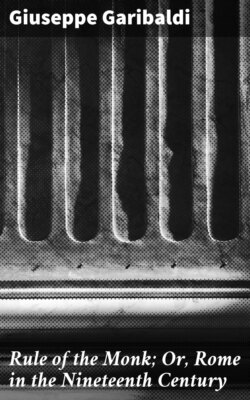Читать книгу Rule of the Monk; Or, Rome in the Nineteenth Century - Garibaldi Giuseppe - Страница 16
На сайте Литреса книга снята с продажи.
CHAPTER IX. THE LIBERATOR
ОглавлениеTable of Contents
Before continuing my story I must remark upon one of the most striking facts in Rome—viz., the conduct and bravery of the Roman soldiery.
Even the Papal troops have a robust and martial air, and retain an individual worth of character to an astonishing degree. In the defense of Rome, all the Roman artillerymen (observe, all) were killed at their guns, and a reserve of the wounded, a thing unheard of before, bleeding though they were, continued to fight manfully until cut down by the sabres of their foes. On the 3d of June the streets were choked with mutilated men, and amongst the many combats after the city was taken, between the Roman soldiery and the foreigners, there did not occur one example where the Romans had the worst of it in any thing like fair fight.
Of one point, therefore, the priesthood is certain—that in every case of general insurrection the Roman army will go with the people. This is the reason they are compelled to hire foreign mercenaries, and why the revenues of the "Vicegerent of Heaven" are spent upon Zouaves, Remington rifles, cartridges, and kilos of gunpowder.
Silvio was received by the triad with exclamations of joy. After saluting them, he turned to Attilio, saying, "Our men are at hand. I have left them hidden in the shadows cast by the marble horses. They but await our signal."
Then Attilio sprang up, saying, "Muzio and I will go at once to the jailer, and secure the keys. You, Dentato, guide Silvia and his men to the door of the cell, and overpower the guard stationed before it."
"So be it," replied Dentato; "Scipio (the dragoon who had introduced Silvio) shall lead you to the jailer's room; but beware Signor Pancaldo, he is a devil of a fellow to handle."
"Leave me to manage him," replied Attilio, and he hastily left the apartment, preceded by Scipio and Muzio. Such an attempt as they were about to make would be a more difficult, if not an incredible thing, in any other country, where more respect is attached to Government and its officers. In Rome little obedience is due to a Government which, alas, is opposed to all that is pure and true.
Dentato, after summoning Silvio's men, led them to the guards stationed at the entrance to the cells. Silvio waited until the sentinel turned his back upon them, then, springing forward with the agility that made him so successful when pursuing the wild boar, he hurled the sentinel to the ground, covering his mouth with his hand to stifle any cry of alarm. The slight scuffle aroused the sleepy questor-guard, but before they could even rub their eyes, Silvio's men had gagged and bound them. As they accomplished this, Attilio appeared with Muzio, convoying the reluctant jailer and his bunch of keys between them.
"Open!" commanded Attilio.
The jailer obeyed with forced alacrity, whereupon they entered a large vaulted room, out of which opened, on every side, doors leading to separate cells. At sight of them, a soldier, the only inmate visible, approached with a perplexed air.
"Where is Signor Manlio?" demanded Antilio; and Pancaldo felt the grip of the young artist clutch his wrist like iron, and noticed his right hand playing terribly with the dagger-hilt.
"Manlio is here," said he.
"Then release him," cried Attilio.
The terrified jailer attempted to turn the key, but some minutes passed before his trembling hands allowed him to effect this. Attilio, pushing him aside as the bolts shot back, dashed open the door, and called to Manlio to come forth.
Picture the sculptor's astonishment and joy when he beheld Attilio, and realized that he had come to release him from his cruel and unjust incarceration. Attilio, knowing they ought to lose no time in leaving the palace, after returning his friend's embrace, bade Muzio lock up the guard in the cell. As soon as this was accomplished, they led the jailer between them through the passages, passing on their way the soldiers whom they had previously bound, who glared upon them with impotent rage, till they gained the outer door in silence and safety. Dividing into groups, they set off at a quick pace, in different directions. Attilio, Muzio, and Manlio, however, retained possession a little while of the jailer, whom they made to promenade, gagged and blindfolded, until they thought their companions were at a safe distance. They then left him, and proceeded in the direction of the Porta Salaria, which leads into the open country.
